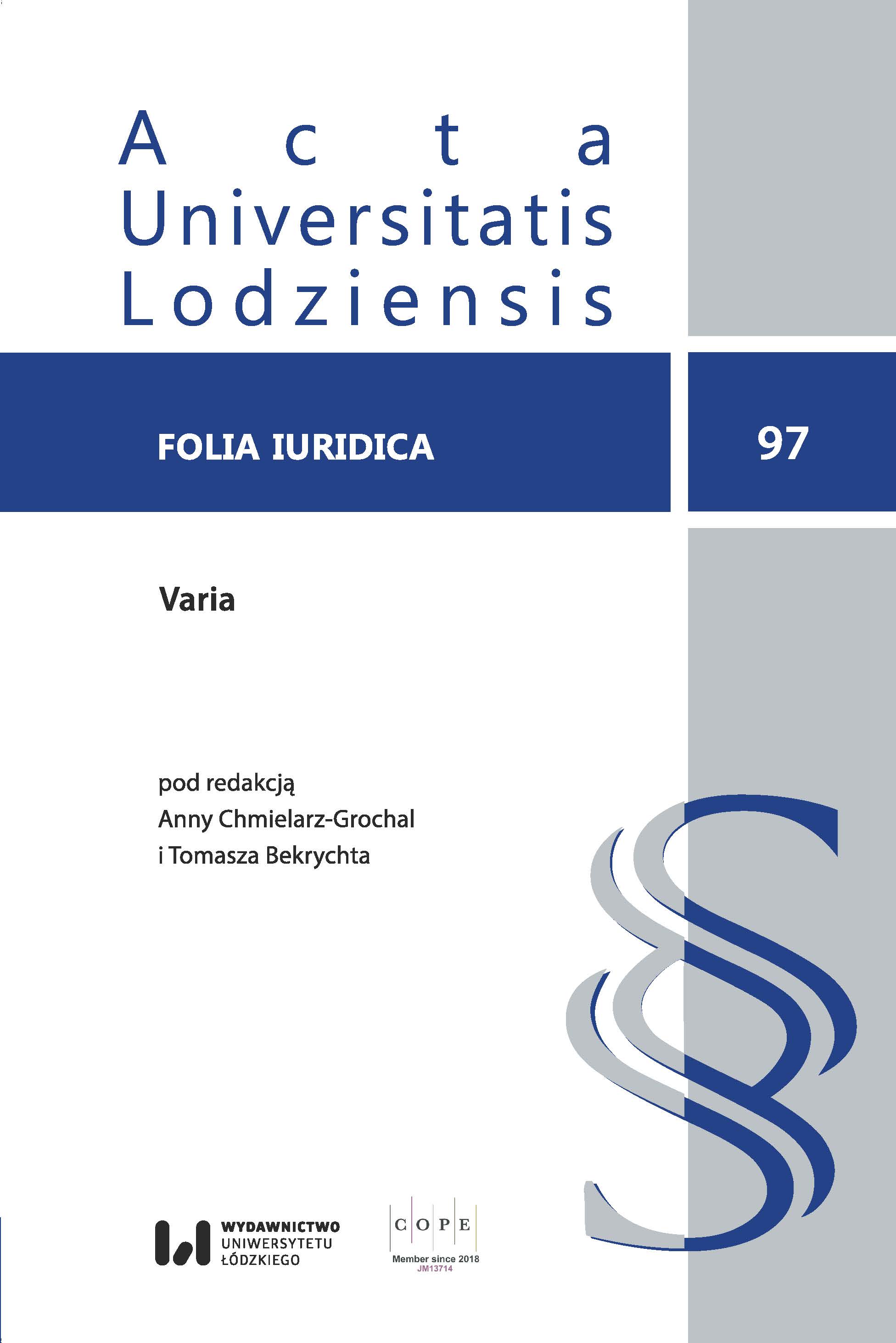Possibility of using rebus sic stantibus clause for the protection of parties of contractual relations affected by the effects of SARS-COV-2
DOI:
https://doi.org/10.18778/0208-6069.97.08Keywords:
state of epidemic, change to the manner of performance of an obligation, contract termination, judicial modification of a legal relationship, rebus sic stantibus clauseAbstract
This article deals with the problem of application of rebus sic stantibus clause, set forth in Art. 357(1) of the Civil Code, in conjunction with announcing by the Minister of Health a state of epidemiological emergency in the territory of the Republic of Poland, and, subsequently, the state of SARS-CoV-2 epidemic. This article aims to determine whether it is permissible to apply the foregoing clause in order to mitigate the effects of the pandemic that may affect a party to contractual relationships and also in relation to which contracts the foregoing clause shall be applicable. The authors analyse, under what circumstances it shall be possible to apply to a court the amount of performance or with a motion to terminate a contract. Attention was drawn to the necessity to have a narrow interpretation of the norm set forth in Art. 357(1) of the Civil Code. An opinion has been presented in this article that the effectiveness of rebus sic stantibus clause may be affected by an admissibility to formulate a claim in pursuance of Art. 357(1) of the Civil Code. of law with a motion to determine a manner of performing anobligation, with a motion to change the amount of performance or with a motion to terminate a contract. Attention was drawn to the necessity to have a narrow interpretation of the norm set forth in Art. 357(1) of the Civil Code. An opinion has been presented in this article that the effectiveness of rebus sic stantibus clause may be affected by an admissibility to formulate a claim in pursuance of Art. 357(1) of the Civil Code.
Downloads
References
Bieniak, Michał. 2020. Nadzwyczajna zmiana stosunków i jej wpływ na zobowiązania (klauzula rebus sic stantibus). Komentarz praktyczny z orzecznictwem. Red. Jerzy Bieluk. Warszawa: Wydawnictwo C.H. Beck
Google Scholar
Brzozowski, Adam. 2020. Kodeks cywilny. Tom I. Komentarz do art. 1–449(10). Red. Krzysztof Pietrzykowski. Warszawa: C.H. Beck.
Google Scholar
Kurosz, Krzysztof. Wiktor Matysiak. 2020. „Klauzula rebus sic stantibus w czasie pandemii”. Przegląd Prawa Handlowego 6: 30–35.
Google Scholar
Longchamps de Berier, Roman. Red. 1948. Zobowiązania. Lwów: Księgarnia Wydawnicza Gubrynowicz i Syn.
Google Scholar
Malarewicz, Agnieszka. 2005. „Wpływ zmiany stosunków na wykonanie zobowiązań – cz. I”. Monitor Prawniczy 11: 539–545.
Google Scholar
Morek, Rafał. 2020. Kodeks cywilny. Komentarz. Tom III A. Red. Konrad Osajda. Warszawa: C.H. Beck.
Google Scholar
Nowak-Górski, Bartłomiej. Dominika Mróz. Krzysztof Olszak. 2020. „Stosowanie klauzuli rebus sic stantibus w dobie epidemii wirusa SARS-CoV-2”. Monitor Prawniczy 10: 507–514.
Google Scholar
Olejniczak, Adam. Red. 2018. Prawo zobowiązań – część ogólna. System Prawa Prywatnego. Tom VI. Warszawa: C.H. Beck.
Google Scholar
Ostrowski, Lucjan. 1998. „Klauzula rebus sic stantibus w świetle procedury cywilnej”. Palestra 7–8: 70–73.
Google Scholar
Robaczyński, Wojciech. Red. 1998. Sądowa zmiana umowy. Warszawa: Dom Wydawniczy ABC.
Google Scholar
Stec, Mirosław. Red. 2020. Prawo umów handlowych. System prawa handlowego. Tom Va. Warszawa: C.H. Beck.
Google Scholar
Strugała, Rafał. 2020. „Wpływ pandemii COVID-19 na wykonywanie umów w świetle art. 3571 KC”. Monitor Prawniczy 11: 560–566.
Google Scholar
Waligórski, Michał. 1947. „Odpowiedź na pytanie prawne”. Państwo i Prawo 5–6: 116.
Google Scholar
Wiśniewski, Tadeusz. 2018. Kodeks cywilny. Komentarz. Tom 3. Zobowiązania. Część ogólna. Red. Jacek Gudowski. Warszawa: Wolters Kluwer Polska.
Google Scholar
Ustawa z 23.04.1964 r. – Kodeks cywilny – Dz.U.2020.1740 t.j. z 8.10.2020 r.
Google Scholar
Rozporządzenie Prezydenta Rzeczypospolitej Polskiej z 27.10.1933 r. – Kodeks zobowiązań – tj. Dz.U. Nr 82, poz. 598.
Google Scholar
Wyrok SN z 22.06.1998 r., I CKN 755/97, Legalis.
Google Scholar
DOI: https://doi.org/10.1097/01253086-199822030-00007
Wyrok SN z 13.01.2000 r., II CKN 644/98, MoP 2000, Nr 12, poz. 791.
Google Scholar
Wyrok SN z 21.06.2001 r., IV CKN 385/00, LEX Nr 52481.
Google Scholar
Wyrok SN z 9.04.2003 r., I CKN 255/01, LEX Nr 78890.
Google Scholar
Wyrok SN z 18.05.2006 r. IV CSK 8/05, LEX Nr 200925.
Google Scholar
Wyrok SN z 21.07.2006 r., III CSK 119/05, LEX Nr 445269.
Google Scholar
Wyrok SN z 16.05.2007 r., III CSK 452/06, LEX Nr 334987.
Google Scholar
Wyrok SN z 22.09.2011 r., V CSK 420/10, OSNC 2012/5/61.
Google Scholar
Wyrok SN z 19.11.2014 r., II CSK 191/14, LEX Nr 1628911.
Google Scholar
Wyrok SA w Katowicach z 25.11.2010 r., V ACa 409/10, OSP 2012, Nr 5, poz. 46.
Google Scholar
Wyrok SA w Szczecinie z 25.04.2013 r., I ACa 83/13, Legalis.
Google Scholar
Wyrok SA w Warszawie z 12.12.2016 r., I ACa 1098/15, Legalis Nr 1564212.
Google Scholar
Wyrok z 22.06.2018 r., II CSK 539/17, OSNC – Zb. dodatkowy 2019, Nr C, poz. 37, 33.
Google Scholar
Uchwała SN z 27.03.2001 r., III CZP 54/00, OSNC 2001, Nr 10, poz. 145.
Google Scholar
Downloads
Published
How to Cite
Issue
Section
License

This work is licensed under a Creative Commons Attribution-NonCommercial-NoDerivatives 4.0 International License.













